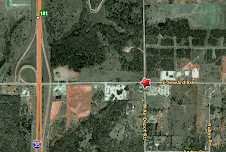Perryville OK is located about 3 miles south of McAlester OK on Hwy
69.
After the establishment of Fort Arbuckle (OK) in 1852,
Perryville was at the intersection of the Military Road from Fort Smith (AK)
crossed the Texas Road. Perryville was
originally the trading post of James Perry, a member of a Choctaw family, and
by 1849, due to its location, it was one of the most important towns of the
day. Colbert Institute, Methodist School
for Chickasaws, was established there in 1854.
Perryville was a stop on the stage route until the KATY Railroad came
thru the area.
Today there isn’t much left but the cemetery. I did find a hand drawn map of the town and
it shows a Whipping Tree – must have been a fun town!
During the Civil War, the Battle of Perryville was
fought in July 1863. After
the defeat of the Confederates in the Battle of Honey Springs, on July 17,
1863, Colonel Cooper's troops fell back to the valley of the Canadian River. Gen James Blunt learned from scouting reports that Col
Cooper and his Confederate forces had withdrawn to the Confederate supply depot
at Perryville.
Blunt, then at Fort Gibson,
reassembled a force of over 4,000 and led them to Perryville. Arriving there on
August 23, 1863, he found that the Confederate commanders, Cooper and Stand Watie (a Cherokee and one of only 2 Indians of the
era to become a general), had already left for Boggy Depot.
The
Confederate Army, short on supplies and facing a larger Union Army, was forced again
to retreat. Only a rear guard, commanded by Gen William
Steele, remained at Perryville. Steele posted a picket line that included two
howitzers to block the road that led into the north side of Perryville.
However, the Union troops deployed on both sides of the road and opened fire
with their own artillery.
The Union forces quickly scattered the Confederate.
Immediately
after the battle, the Federals captured all of the supplies they could use and burned
what they couldn’t carry or use along with the village that had been serving as
a regular military post and was an important depot. Blunt proceeded to
Fort Smith and captured the fort on September 1, 1863.
Realizing they were losing, during
their retreat,
Confederate soldiers poured a large quantity of salt into the village well
before their departure to assure that the advancing Union
forces could not use the site.
















No comments:
Post a Comment